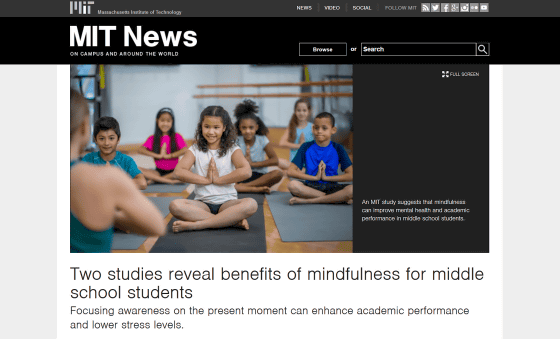Meditation can improve children's grades and reduce stress

by
In recent years, meditation (mindfulness) has been gaining attention worldwide for its potential to improve work performance and reduce stress. A research team at the Massachusetts Institute of Technology (MIT) has published research results showing that mindfulness can improve children's grades and reduce stress.
Two studies reveal benefits of mindfulness for middle school students | MIT News
http://news.mit.edu/2019/mindfulness-mental-health-benefits-students-0826

Mindfulness training reduces stress and amygdala reactivity to fearful faces in middle-school children. - PsycNET
Greater Mindfulness is Associated With Better Academic Achievement in Middle School - Caballero - 2019 - Mind, Brain, and Education - Wiley Online Library
https://onlinelibrary.wiley.com/doi/10.1111/mbe.12200
'Mindfulness is the ability to pay attention to the present moment, rather than being distracted by external events or your own thoughts,' says John Gabrieli , a professor of neuroscience and cognitive science at MIT. 'If you can focus on the teacher or homework in front of you, it can help you learn.'
The research team conducted an experiment to examine the effects of mindfulness on 100 sixth grade students in the United States (sixth grade elementary school students in Japan) by dividing them into two groups. One group received daily mindfulness training for eight weeks, while the other group did not. The mindfulness training was designed to have the students pay attention to their breathing and focus their attention on the present, rather than the past or future.
The students in the mindfulness training group reported a decrease in their stress levels, while the untrained group did not. The students who received the mindfulness training also reported less negative emotions, such as sadness and anger.

by
Forty of the students also participated in a pre- and post-study experiment to measure activity in the amygdala, which is responsible for processing emotional responses. The experiment involved students looking at pictures of people expressing different emotions, and monitoring how active their amygdala became when they looked at the pictures.
Students who reported high stress levels at the start of the experiment showed increased amygdala activity when they viewed faces expressing fear. It's known that people who experience a lot of stress have a stronger negative reaction to adverse events, and 'there's evidence that a stronger amygdala response to negative events is associated with a higher risk of depression in childhood,' Gabrieli said.
Furthermore, children who underwent mindfulness training had lower stress levels before the experiment, and as a result, amygdala activity in response to fearful faces was also reduced. Based on these results, the research team believes that mindfulness may be useful in preventing or alleviating stress-related mood disorders. Richard Davidson , professor of psychology and psychiatry at the University of Wisconsin , said, 'This study is one of the first rigorous studies to demonstrate that mindfulness training has behavioral and neurological benefits in children.'

by
In addition to conducting actual mindfulness training, the research team also conducted a survey to assess and analyze children's mindfulness tendencies. The research team conducted a survey based on the Mindful Attention Awareness Scale on over 2,000 students enrolled in grades 5 through 8 in the United States. The researchers assessed the students' mindfulness-related tendencies by asking questions such as, 'How focused are you while performing an action?'
The research team compared these results with the students' academic performance, statewide standardized test scores, attendance rates, and number of suspensions. They found that students who showed more mindfulness tendencies had higher academic scores and fewer absences and suspensions. 'No one has quantitatively investigated whether children with higher mindfulness tendencies are more likely to do well in school,' Gabrieli said, claiming that this study is the first to show a link between mindfulness traits and school life.
'I think it's likely that incorporating mindfulness training into a daily classroom curriculum would be beneficial,' Gabrieli said. However, he added that mindfulness training is meaningful if it's continued over the long term, so daily training is important to reap the benefits of mindfulness.

Related Posts:







